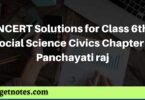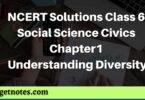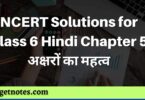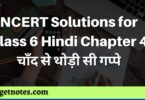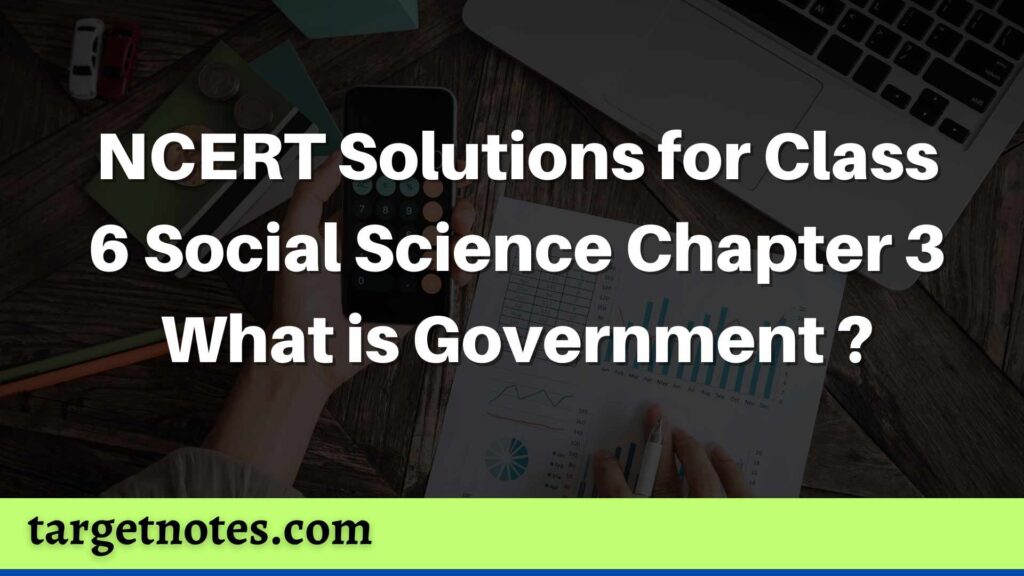
आज हम आप लोगों को NCERT Solutions for Class 6 Social Science Chapter 3 What is Government? के बारे में बताने जा रहे है इसके अतिरिक्त यदि आपको और भी NCERT CIVICS से सम्बन्धित पोस्ट चाहिए तो आप हमारे website के Top Menu में जाकर प्राप्त कर सकते हैं।
| Board | CBSE |
| Textbook | NCERT |
| Class | Class 6 |
| Subject | Civics |
| Chapter | Chapter 3 |
| Chapter Name | What is Government? |
| Number of Questions Solved | 05 |
| Category | NCERT Solutions |
Contents
NCERT Solutions for Class 6 Social Science Chapter 3 What is Government ?
Q1. What do you understand by the word ‘government’? List five ways in which you think the government affects your daily life.
Answer:
Government is the mechanism or groups which governs and implements decisions in an organised manner formed under certain written rules.
Five ways in which government affects your daily life:
(i) It protect the boundaries of the country and maintain peaceful relations with other countries.
(ii) It takes action on many social issues.
(iii) It ensures welfare of its citizens and provide health facilities.
(iv) It ensures the supply of food and drinking water to its people.
(v) It helps in running of the postal and railways services.
Q2. Why do you think the government needs to make rules for everyone in the form of laws?
Answer:
Government needs to make rules for everyone in the form of laws because:
(i) It helps in preventing the authority from the misuse of their powers.
(ii) It helps in the functioning of the government.
(iii) It helps the people in leading their normal and peaceful life.
(iv) It ensures the security of the nation and its people.
Q3. Name two essential features of a democratic government.
Answer:
Two essential features of a democratic government:
(i) People have the right to elect their own Government throgh elections.
(ii) Government is accountable to its people.
(iii) Universal Adult Franchise.
Q4. What was the suffrage movement? What did it accomplish?
Answer:
Suffrage means right to vote. Women and the poor have had to fight for participation in government all over Europe and USA. During the first world war, it got strengthened and known as the suffrage movement.
It gave right to vote to the America women in 1920 and women in the UK got to vote on the same terms as men in 1928.
Q5. Gandhiji strongly believed that every adult in India should be given the right to vote. However, a few people don’t share his views. They feel that illiterate people, who are mainly poor, should not be given he right to vote. What do you think? Do you think this would be a form of discrimination? Give five points to support your view and share these with the class.
Answer:
Yes, it would be a form of discrimination on the basis of education. Five points to support my view:
(i) These people will not able to participate in the Government and hence feel neglected from the society.
(ii) People from all classes fought for the independence and these rights thus everyone should be treated equally.
(iii) People are not illiterate or poor by their choice.
(iv) Every adult should be given right to vote according to Universal Adult Franchise.
(v) It will conflict the idea of right to equality of Democracy.
Important Link…
- अधिकार से आप क्या समझते हैं? अधिकार के सिद्धान्त (स्रोत)
- अधिकार की सीमाएँ | Limitations of Authority in Hindi
- भारार्पण के तत्व अथवा प्रक्रिया | Elements or Process of Delegation in Hindi
- संगठन संरचना से आप क्या समझते है ? संगठन संरचना के तत्व एंव इसके सिद्धान्त
- संगठन प्रक्रिया के आवश्यक कदम | Essential steps of an organization process in Hindi
- रेखा और कर्मचारी तथा क्रियात्मक संगठन में अन्तर | Difference between Line & Staff and Working Organization in Hindi
- संगठन संरचना को प्रभावित करने वाले संयोगिक घटक | contingency factors affecting organization structure in Hindi
- रेखा व कर्मचारी संगठन से आपका क्या आशय है ? इसके गुण-दोष
- क्रियात्मक संगठन से आप क्या समझते हैं ? What do you mean by Functional Organization?

